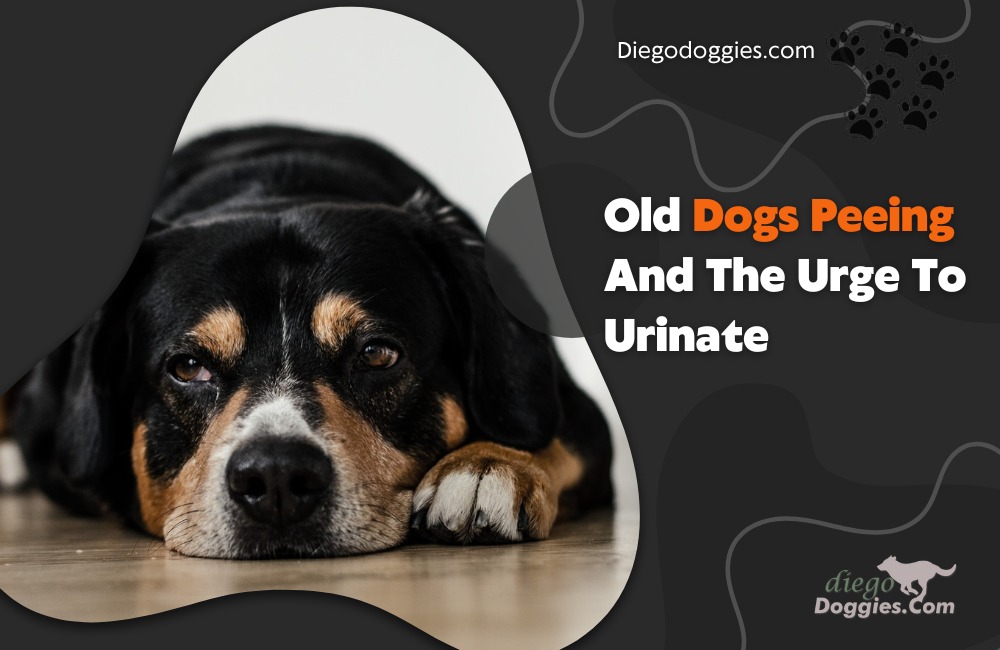There are several possible causes for your dog’s sudden urge to urinate inside the house. It could be a medical problem, such as an infection or bladder stones. Or, it could be a behavioral issue, such as anxiety or excitement.
If your dog is house-trained and has started urinating indoors, it’s important to figure out the cause so you can address it appropriately.
Old Dogs And The Urge To Urinate: Medical Causes
One possible medical cause of your dog’s urge to urinate indoors is an infection. Urinary tract infections are relatively common in dogs and can cause a sudden change in urination habits.
If your dog is urinating more frequently than usual, or if there is blood in their urine, it’s important to take them to the vet for a check-up. Other possible medical causes of indoor urination include bladder stones and diabetes.
Old Dogs And The Urge To Urinate: Behavioural Causes
Another possible cause of your dog’s indoor urination is a behavioral issue. One common behavioral cause is excitement urination, which occurs when your dog gets too excited and urinates without meaning to. This is often seen in young puppies but can also happen with older dogs.
If your dog is urinating indoors due to excitement, you’ll need to work on training them to stay calm in situations where they might get too excited. Another behavioral cause of indoor urination is anxiety. If your dog is anxious, it may start urinating indoors to relieve its anxiety.
This is often seen in dogs who are afraid of loud noises or unfamiliar people and can be resolved through behavior modification training.

Old Dogs And The Urge To Urinate: How To Address It
If your dog is urinating indoors due to a medical problem, the first step is to take them to the vet for a check-up. If a urinary tract infection is causing the problem, your vet will prescribe antibiotics to clear it up.
If bladder stones are the issue, your vet will recommend a course of treatment based on the size and number of stones. If diabetes is the cause, your vet will work with you to develop a treatment plan to keep your dog’s blood sugar levels under control.
How To Retrain An Old Dog To Pee Outside Again: Crate Training Method
One way to retrain an old dog to pee outside is to use the crate training method. This involves confining your dog to a small space, such as a crate or a bathroom, for short periods of time. Each time you let your dog out of the confined space, take them outside to urinate.
With enough repetition, your dog will start to associate being let out of the confined space with going outside to urinate.
Old Dogs And The Urge To Urinate: Medication/Herbal Treatment
If your dog is urinating indoors due to anxiety, your vet may prescribe medication to help relieve their anxiety. There are also several herbal treatments that can be effective for dogs with anxiety. Some popular options include chamomile, lavender, and valerian root.
Herbs For Dogs: Are There Traditional Natural Remedies Made For Canines?
Yes, there are several traditional herbs that have been used for centuries to treat various ailments in dogs. Some popular options include chamomile, lavender, and valerian root. These herbs can be given to dogs in a variety of forms, including as a tea, tincture, or capsule.

Frequently Asked Questions and Answers about Old Dogs and the Urge to Urinate
Another behavioral cause of indoor urination is anxiety. If your dog is anxious, it may start urinating indoors to relieve its anxiety. This is often seen in dogs who are afraid of loud noises or unfamiliar people and can be resolved through behaviour modification training.
Conclusion
There are several reasons why your dog may be urinating indoors, but there are also several things you can do to help them. If your dog is having medical problems, the first step is to take them to the vet. If anxiety or excitement is the issue, you’ll need to work on training and desensitization.
Finally, if you just want to prevent accidents from happening in the first place, make sure to take them out frequently and give them plenty of water.
Related Contents
- 11 Important Tips To Help Your Dog Lose Weight and Become Healthier
- 12 Swimming Safety Tips for Your Dog
- 14 Ways to Help Keep Your Dog Happy and Healthy
- 5 Reasons Why Your Dog Needs a Dog Life Jacket
- A Step-By-Step Guide To Removing A Tick From Your Dog
- Collars Versus Harnesses for French Bulldogs
- Cutting a Dog’s Nails: How to Prevent Bleeding
- Dachshund Health Problems and How to Prevent Them
- Dog Pregnancy Guide: Signs, Care And Preparation
- Dog Teeth Cleaning in San Diego: The Pros and Cons
- Flea Treatment for Dogs- What Is the Best Flea Treatment For Dogs
- Guide For Preventing Hip Dysplasia In Golden Retrievers
- How a Dog Microchip Works
- How Much Exercise Does a Dog Need
- How To Avoid Dog Heatstroke
- How to Choose the Right Dog Daycare in San Diego
- How To Clean Your Dog’s Teeth Yourself – And Is It Necessary
- How To Cut An Uncooperative Dog’s Toenails
- How to Get a Dog to Stop Barking At Night
- How to Get Rid of Fleas on Your Dog
- How to Help a Dog with Allergies: Causes, Signs, Treatment
- How to Help an Overweight Dog
- How to Improve Dog Oral Health in 6 Simple Steps
- How to Improve your Dog’s Immune System: All-Natural Ways
- How to Potty Train Puppies: A Comprehensive Guide for Success
- How to Stop a Dog from Ripping Your Car Apart: The Ultimate Guide
- How to Stop Dachshund Behavior Problems: The Ultimate Guide
- Is Your Dog Barking Excessively And Annoying Your Neighbours?
- My Dog Keeps Sneezing: Causes, Dangers, and Treatment Options
- Presa Canario vs Cane Corso – Which Breed is Right for You?
- Seven Best Dog Foods for Weight Loss
- The Benefits of Liquid Gold for Dogs
- The Best Dog Toys to Keep Them Busy: Suited for Breed and Environment
- The Top 16 Most Common Dog Questions: Answered
- Top 7 Ways to Build a Stronger Bond with Your Dog
- Top Eight Benefits To Canine Massage
- Top Five Benefits of Microchipping Your Dog
- Types of Short-Haired German Shepherds: Which One is Right for You?
- What You Should Do To Become a Responsible Dog Owner

